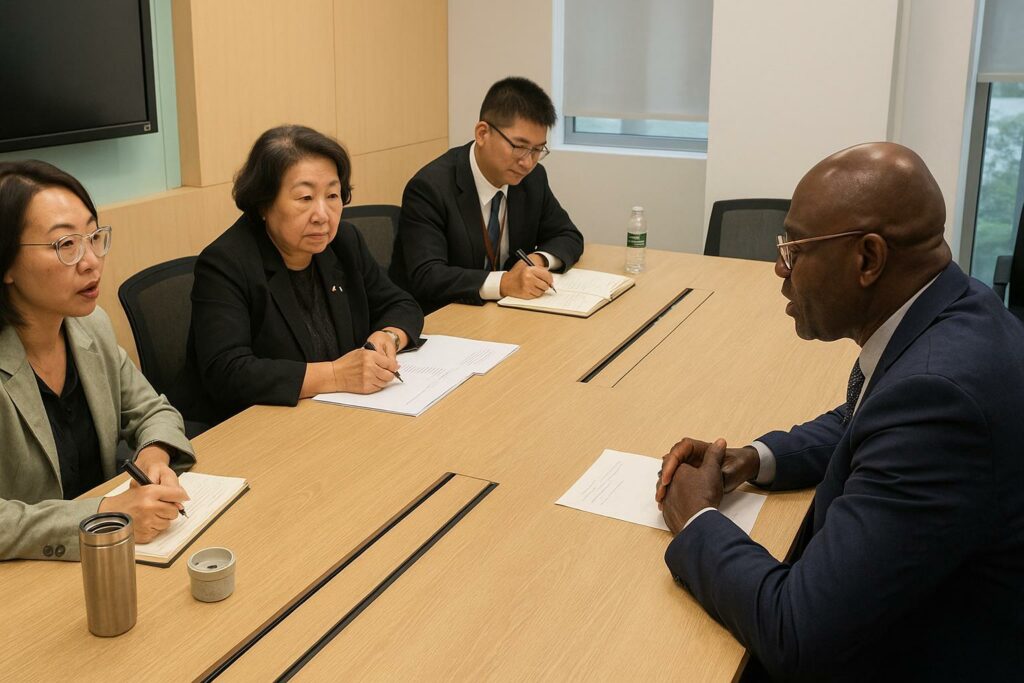Diplomatic Courtesies and Strategic Interests
The marble-lined corridors of Hong Kong’s Convention Centre have been hosting an intense ballet of diplomats since 15 October, date chosen for the first statutory session of the International Organisation for Mediation (IOMed). Among the early arrivals, Ambassador Guy Nestor Itoua, Secretary-General of the Ministry of Foreign Affairs, Francophonie and Congolese Abroad, quickly became a sought-after interlocutor. His meeting with Teresa Cheng, former justice secretary of the Hong Kong Special Administrative Region and sole candidate declared for the post of IOMed secretary-general, took place behind closed doors but its substance rapidly filtered through the delegates’ informal networks.
According to converging diplomatic sources, the Chinese jurist requested Brazzaville’s endorsement ahead of the 20 October ballot. In response, Ambassador Itoua highlighted “the exemplary density of friendship and cooperation between the Republic of Congo and the People’s Republic of China”, recalling that President Denis Sassou Nguesso co-chairs the Forum on China–Africa Cooperation, a platform that has steadily elevated Congo’s international visibility.
IOMed: From League of Nations Dream to Tangible Framework
The idea of a standing inter-state mechanism devoted exclusively to mediation is not new. Jurists at the time of the League of Nations envisaged such an institution, yet the project languished for nearly a century. It eventually took shape on 30 May 2025, when 48 states signed the Hong Kong Convention establishing IOMed. Shortly thereafter, Congo ratified the treaty, thus placing itself among the so-called “first movers” that converted a legal concept into an operational reality.
The organisation fills a normative gap by offering a structured alternative to arbitration and litigation. More specifically, it provides a procedural avenue for disputes between a state and nationals of another state or for commercial conflicts submitted by mutual consent, in accordance with Article 33 of the United Nations Charter. Legal experts present in Hong Kong note that IOMed’s rules strike a delicate balance between confidentiality, enforceability of settlements and respect for domestic public policy.
Teresa Cheng’s Candidacy and Beijing’s Stakes
Teresa Cheng enters the race with a résumé that blends academic depth and practical experience: chair professor of law, senior counsel, engineer and former government minister. Her campaign team, led on the diplomatic front by Zhou Qian, Director-General for Legal Affairs at China’s Foreign Ministry office in Hong Kong, has multiplied bilateral consultations in the margins of the conference.
For Beijing, securing the first secretary-generalship constitutes both a symbolic and strategic objective. Hosting the institution and piloting its secretariat would underscore China’s positioning as a patron of rule-based global governance, particularly in the Global South. Support from African partners such as Congo therefore carries disproportionate weight. “Our friendship with Brazzaville is long-standing; in multilateral fora it has always been dependable,” a Chinese delegate remarked, requesting anonymity.
Brazzaville’s Calculus: Trade, Zero Tariffs and Soft Power
Beyond the courtesies, the Congolese endorsement fits within a broader economic rationale. Congo is keen to leverage the zero-tariff scheme that Beijing grants on 98 percent of taxable goods imported from least-developed countries, a facility announced in phases since 2022. By advocating a mediation body that could streamline cross-border commercial relations, Brazzaville signals to investors that contractual disagreements will find swift, apolitical settlements.
Domestic observers also perceive a soft-power dividend. Within the highly competitive diplomatic arena of Central Africa, an active role in an emerging global institution burnishes Congo’s image as a constructive, law-abiding actor. “Supporting IOMed costs little and earns the country reputational capital,” analyses Rodrigue Ngouabi, lecturer at Marien-Ngouabi University, noting that reputational assets often translate into concessional financing and technology transfers.
Legal Perspective: Implementing Article 33 Charter
From a jurisprudential standpoint, IOMed operationalises modalities of dispute settlement long enumerated but rarely institutionalised: negotiation, enquiry, mediation, conciliation, arbitration and judicial settlement. By ratifying the Hong Kong Convention, Congo commits to recognise mediated agreements arising under the organisation’s auspices as binding, subject to national procedural safeguards.
Government lawyers stress that such recognition does not dilute sovereignty. On the contrary, it affords each party—state or private operator—predictable tools to de-escalate frictions before they burgeon into costly arbitration or politicised litigation. In the words of a senior official at the Ministry of Justice, “mediation protects public finances and preserves diplomatic goodwill; it is preventive diplomacy in legal dress.”
Key Takeaways for Congo–China Relations
The endorsement of Teresa Cheng is not an isolated gesture but rather an additional strand in a dense bilateral weave that already encompasses infrastructure loans, energy cooperation and pandemic-related assistance. Hong Kong’s summit afforded Brazzaville a stage to reiterate its commitment to a community of shared future, the cornerstone of China’s South-South engagement narrative.
In parallel, Congo enhances its voice within an institution that could become to mediation what the Permanent Court of Arbitration is to arbitration. Should IOMed prove effective, early supporters may enjoy privileged access to its roster of mediators and capacity-building programmes, assets that could strengthen domestic dispute-resolution frameworks.
Looking Ahead: Mediation as Pillar of Multilateralism
All eyes now turn to the 20 October vote. If, as widely expected, Teresa Cheng secures the secretary-generalship, her first challenge will be to translate the founding convention into operating rules agreeable to a culturally diverse membership. Congo, having positioned itself on the front row, is likely to lobby for a seat on the inaugural governing council.
In an international environment marked by proliferating sanctions regimes and judicial over-congestion, the success of IOMed would constitute an incremental yet meaningful step towards cooperative conflict management. For Brazzaville, the Hong Kong summit has already achieved a diplomatic gain: affirming the Republic’s preference for dialogue over confrontation while consolidating ties with its principal strategic partner.

